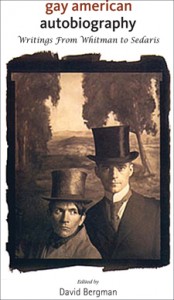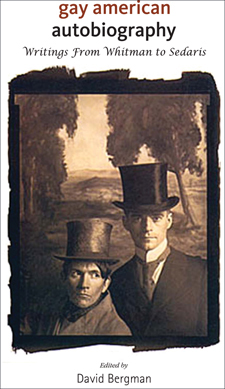 Gay American Autobiography: Writings
Gay American Autobiography: Writings
from Whitman to Sedaris
Edited by David Bergman
University of Wisconsin Press. 403 pages, $29.95
THIS VOLUME presents itself as the first anthology to include a full range of gay men’s autobiographical writings, and editor David Bergman accomplishes this by presenting about forty entries spanning some 150 years, each chronicling an author’s personal moments and milestones as a gay writer.*
Bergman is known in scholarly circles for his work on American gay poets—he’s the poetry editor for this magazine—but he has also edited fiction for the “Men on Men” series, authored a scholarly history of the Violet Quill authors, and written many works of literary criticism. The writings selected for this volume showcase a wealth of autobiographical styles: the clear-eyed chronicler, the impassioned activist, the academician. The themes covered run the gamut from interior struggles with secret desires to the search for gay ancestors and (of course) tales of sexual pursuit and conquest. The diversity of writers is matched by the genres of “life writing” Bergman has compiled. Included are poignant and telling excerpts from letters and journals by the likes of Henry David Thoreau and Henry James to their respective male friends; an essay by Jaime Manrique in remembrance of Cuban writer Reinaldo Arenas; an excerpt from the autobiography of Claude Hartland, the first homosexual work of its kind published in the U.S. and meant to help doctors cure “an affliction”; a transcribed oral history given by the female impersonator and performer Minette; and excerpts from books and memoirs from composer Ned Rorem’s New York Diary and John Rechy’s The Sexual Outlaw: A Documentary. The risk in editing such a volume, of course, is criticism about what’s left out; complaints from those who miss their favorite writers is inevitable. How could he leave out Mark Doty’s Heaven’s Coast? Why include this passage from Samuel R. Delany’s The Motion of Light in Water and not another? And, what, no Gore Vidal, no Christopher Isherwood, no Paul Bowles? Bergman is of course aware that he couldn’t include every author or everyone’s favorite selection. However, he provides a comprehensive gem of a bibliography at the back of the book that includes a great many important authors and texts. Moreover, Bergman’s strategy is not to create a “greatest hits” of gay writings but instead to introduce readers to illuminating passages that they may not have encountered previously and in this way enable them to see some well known authors (e.g., Thoreau, Henry James) in a new light, and to discover some new voices as well. There are even some surprises when we encounter a writer we know well in a different genre. Readers familiar with Samuel Delany’s science fiction may not be aware of his delightfully intelligent autobiographical work. Or take Lincoln Kirsten, who’s known primarily as an impresario and producer rather than as a writer. Also included are a number of poets, such as Edward Field, Essex Hemphill, and Justin Chin, whose prose work readers may not be familiar with. In fact, the concept of genre is a crucial question that arises for readers. Just what is autobiographical writing? What can it do best that other forms of writing do not? What happens when the lines start to blur, as in Edmund White’s work (included here is White’s “Writing Gay”)? Bergman touches on some of these questions in his helpful introduction, where he writes: “What strikes me about gay autobiography—particularly the less literary autobiographies—is the urgency of the writing. Behind the most matter-of-fact tone is a fervent desire for understanding, and this desire for understanding has not necessarily been reduced over the years as homosexuality has become more accepted.” Essential issues of context are also provided in Bergman’s brief but well-considered introductions to each entry. But the real pleasure of the book, of course, is its walk through 150 years of gay history, a walk through lives, loves, and the powerful, lasting shape a single voice can carve out of silence. * There was a monograph, not a collection, published in 1999 titled Gay Lives: Homosexual Autobiography from John Addington Symonds to Paul Monette, by Paul Robinson. Another critical history, Writing Desire: Sixty Years of Gay Autobiography, by Bertram Cohler, appeared in 2007. Christopher Hennessy is an associate editor of this journal and the author of Outside the Lines: Talking with Contemporary Gay Poets (2005).





